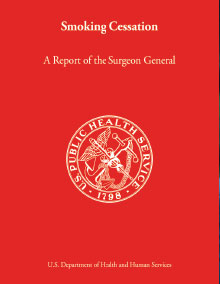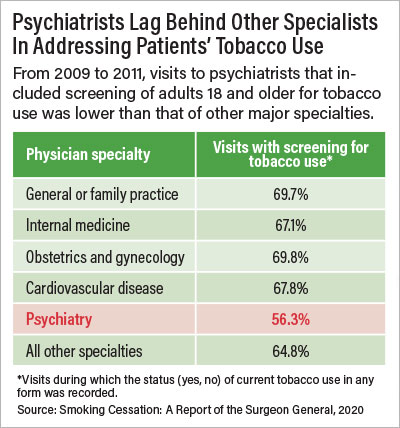Surgeon General on Smoking: Most Want to Quit
Abstract
The Surgeon General’s new report on smoking cessation states that individuals seeing psychiatrists are more likely to smoke, yet less likely to receive screening for tobacco during psychiatrist office visits.

Despite a dramatic decline in cigarette smoking over the past several decades, there are still 34 million adults who smoke in the United States, according to the 2020 Surgeon General’s report, “Smoking Cessation.”
More than two-thirds of adult smokers want to quit, and the majority have tried to stop smoking at least once during the past year, according to findings in the 700-page, peer-reviewed report. It provides an extensive review of scientific literature on smoking cessation published between 2000 and 2018.
Individuals with behavioral health conditions smoke at a significantly higher rate than the general population and generally have a harder time quitting. In fact, adults with mental illness or substance use disorders account for 4 in 10 of all cigarettes smoked, the report stated.
“Individuals with psychiatric and substance use disorders want to quit smoking, but as this report indicates, health care professionals are not doing enough to ask about smoking and desire to quit,” said Smita Das, M.D., M.P.H., Ph.D., medical director of psychiatry at Lyra Health and a clinical assistant professor of psychiatry at Stanford University School of Medicine.
“More than 40% of smokers are not receiving advice to quit, and psychiatrists are even less likely than general or family physicians to screen when it comes to smoking, according to the National Ambulatory Medical Care Survey [NAMCS] data cited in the surgeon general’s report,” Das told Psychiatric News.
Visits to psychiatrists were less likely to include screening for tobacco use compared with visits to other medical specialists, the report stated, citing the NAMCS data (see table).

Das pointed out that evidence-based interventions, such as the seven FDA-approved cessation medications, are also underutilized. “Fewer than 1 in 3 smokers trying to quit uses an evidence-based method, like tobacco counseling or medications. This is a small step we can take as psychiatrists to prolong the life of our patients.”
Surgeon General Jerome M. Adams, M.D., M.P.H., wrote in the report that if physicians in all medical disciplines as well as other health care professionals began taking advantage of opportunities to inform and encourage smokers to quit, they could help enable half a million more smokers to quit each year.
Approaches proven to help smokers with behavioral health disorders quit include cessation pharmacotherapy, combined with motivational or stage-based treatments and behavioral therapy, the report stated. (Stage-based interventions are tailored to smokers’ stage of readiness to quit and are designed to move them forward through subsequent stages to eventual success.)
The report added, “The convenience and accessibility of quitlines make them an important option for clinician referrals among this population.” (Quitlines provide tobacco cessation assistance through a toll-free telephone number.)
Evidence increasingly suggests that quitting smoking does not jeopardize success of treatment for mental or substance use disorders, but may actually enhance recovery outcomes, the report stated. In trials of tobacco cessation interventions among individuals with psychiatric disorders, quitting smoking was associated with reductions in depression, anxiety, symptoms of posttraumatic stress disorder, psychosis, and rapid changes in mood.
Some other findings from the report are as follows:
When it comes to the use of nicotine replacement therapy (NRT), it is particularly effective in helping highly nicotine-dependent smokers quit, compared with smokers with lower levels of nicotine dependence. Combining short- and long-acting forms of NRT (such as nicotine patches and gum) boosts smoking cessation, compared with using single forms of NRT.
Evidence shows that behavioral counseling and cessation medications boost smoking cessation, compared with self-help materials or no treatment. They are even more effective when used together. Also effective are quitline counseling and short text messaging services encouraging cessation.
Evidence is inadequate that smartphone apps help smokers quit. There is also inadequate evidence that e-cigarettes help cigarette smokers quit.
Regarding public policy, the report states that smoking cessation can be increased by raising the price of cigarettes, adopting comprehensive smoke-free policies, implementing mass media campaigns, requiring pictorial health warnings, and maintaining comprehensive statewide tobacco control programs. ■



